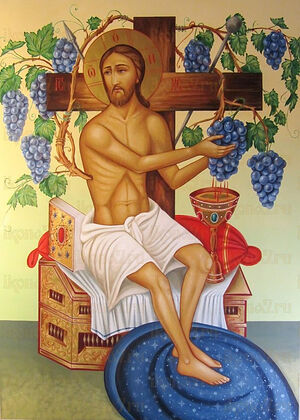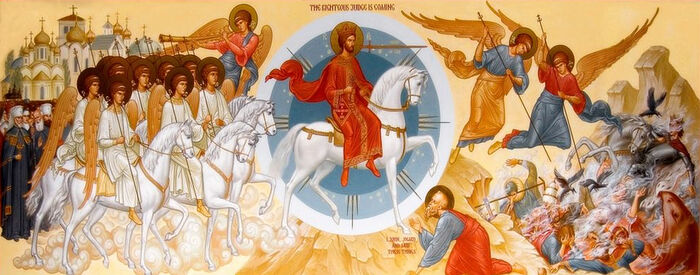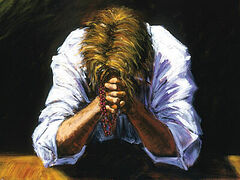In his writings, St. Stephan doesn’t directly formulate an idea of the objectives of the Christian life. At the same time, all of his works are permeated with a call to the work of the salvation of the soul. In the saint’s understanding, salvation is the absolute goal of all labors and tribulations endured by a Christian.
 St. Stephan of Fileika But how does St. Stephan understand salvation? First, in the absolute sense, he understands salvation as “liberation from sin and deliverance from eternal torment.” Second, union with God and the knowledge of God, which will be the source of eternal blessed joy. Likewise, Orthodox theological thought in relation to salvations says that it is man’s deliverance from sin and its consequences: eternal perdition, condemnation, and spiritual death. In his works, Fr. Stephan tries to inspire man to turn to the God Who is seeking him and to begin communion with God.
St. Stephan of Fileika But how does St. Stephan understand salvation? First, in the absolute sense, he understands salvation as “liberation from sin and deliverance from eternal torment.” Second, union with God and the knowledge of God, which will be the source of eternal blessed joy. Likewise, Orthodox theological thought in relation to salvations says that it is man’s deliverance from sin and its consequences: eternal perdition, condemnation, and spiritual death. In his works, Fr. Stephan tries to inspire man to turn to the God Who is seeking him and to begin communion with God.
It should be noted that the saint here echoes St. Theophan the Recluse, who considered communion with God to be the ultimate goal of man’s earthly life. Likewise, St. Ignatius (Brianchaninov) speaks of salvation as the unity of God and man. Third, as Fr. Stephan notes, salvation is inextricably connected to the likeness of Christ, the return of man to the godlikeness that he had before the Fall.
In his works, St. Stephan repeatedly identifies the salvation of the soul with the concept of the Kingdom of God, or in other words, eternal life, which includes “eternal peace and blessedness of the soul and eternal joy in God.”
To one degree or another, all of Fr. Stephan’s works are Christocentric, as no one can be saved without Christ.
Thus, “Christology (understood, of course, not only in the narrow sense, that is, not only as the doctrine of how the two natures are united in Christ) and soteriology, inextricably bound up with it, are the beginning and end of all the Church’s theology,” concludes Prof. Alexei Sidorov. “The idea of the salvation of mankind in Jesus Christ determines the whole spirit of the worldview of the direct successors, the direct disciples of the Lord and … all of the Christian life must be oriented towards it.” “Only through Christ,” writes Fr. Stephan, “only through union with Him can man receive regeneration and become the heir of eternal life.”
 Christ the True Vine Man retained hope of salvation even after the Fall, but it was impossible to achieve by human effort alone. It became possible only through the coming of the Savior into the world. This faith in the promised Savior of the world enlivened Old Testament mankind with hope. Thus, “all the institutions of the Old Testament Church were directed towards maintaining faith in the coming Redeemer. All the laws given through Moses were to prepare the Israelites to accept Him. The tribe from which He would come was specified, the seedless conception from the Virgin was prophesied, and the place and time of His Nativity… Even the Gentiles scattered throughout the East were then waiting for an event in Judea that would revolutionize the whole world. Christ comes to call sinners to repentance and to redeem us from eternal death with His Blood.” Fr. Stephan doesn’t go into dogmatic details but states that it was only through the Savior’s death on the Cross that it became possible for man to turn to God again, to unite with Him, and through this “receive an immortal, eternally blessed life.”
Christ the True Vine Man retained hope of salvation even after the Fall, but it was impossible to achieve by human effort alone. It became possible only through the coming of the Savior into the world. This faith in the promised Savior of the world enlivened Old Testament mankind with hope. Thus, “all the institutions of the Old Testament Church were directed towards maintaining faith in the coming Redeemer. All the laws given through Moses were to prepare the Israelites to accept Him. The tribe from which He would come was specified, the seedless conception from the Virgin was prophesied, and the place and time of His Nativity… Even the Gentiles scattered throughout the East were then waiting for an event in Judea that would revolutionize the whole world. Christ comes to call sinners to repentance and to redeem us from eternal death with His Blood.” Fr. Stephan doesn’t go into dogmatic details but states that it was only through the Savior’s death on the Cross that it became possible for man to turn to God again, to unite with Him, and through this “receive an immortal, eternally blessed life.”
Drawing from Sacred Scripture, the saint gives examples of unity with Christ by various comparisons. “For example… He is the head, and we are the body; He the vine, we the branches (cf. Jn. 15:1-8); He the shepherd, we the flock (cf. Jn. 10:1-16); He is life, and we live by Him (cf. Jn. 14:6, Jn. 11:25); we the temple, He the inhabitant” (cf. 1 Cor. 3:16-17). Only Christ is the true Son of God, the Savior “according to your faith, and the Deliverer of all people by the work of His redemption.” There can be no condemnation “for those who live in Christ Jesus according to His spirit, and not according to the law of flesh” (cf. Rom. 8:9). “It is only through union with Christ that we can receive generation (cf. Mt. 19:28) and become an heir to eternal life,” concludes Fr. Stephan.
St. Stephan emphasizes that man must make the knowledge of God and the salvation of the soul the goal of his earthly life, because only “here, under the changes of time, can the judgments of the Lord be changed; but in the future age, everything will be eternal and unchangeable.” That’s why St. Stephan so often turns his gaze to the last times and first of all to the Dread Judgment. From his instructions flows, if indirectly, the purpose of a Christian’s life—namely, to prepare for this terrible day, when God will judge the works of mankind.




